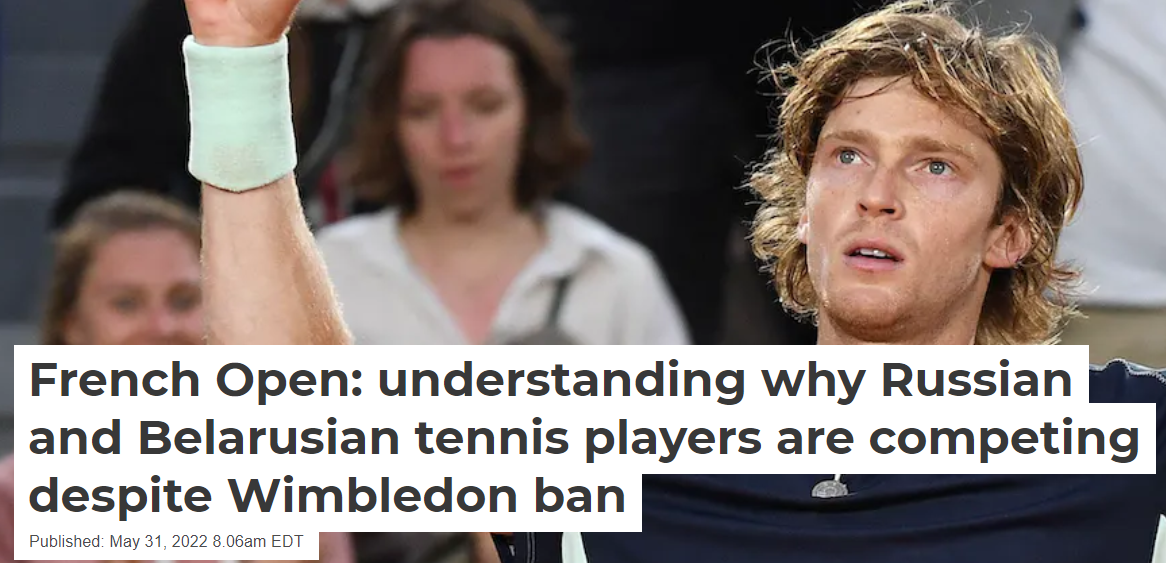Thought piece: "French Open: understanding why Russian and Belarusian tennis players are competing despite Wimbledon ban" (Davies and Duignan)
Originally published in ‘The Conversation’, available here: French Open: understanding why Russian and Belarusian tennis players are competing despite Wimbledon ban (theconversation.com)
The world’s best tennis players are on court at the 2022 French Open, the first grand slam since the Russian invasion of Ukraine began in February. Unlike Wimbledon 2022, the French Open has decided to let Russian and Belarusian players compete.
The French Open decision is in line with other tennis tournaments since the Russian invasion, which have allowed Russian and Belarusian players to participate. This outcome may partly be due to the backlash from players and from the governing body of world tennis the International Tennis Federation (ITF), after the All England Lawn and Tennis Club (AELTC) and the Lawn Tennis Association banned Russian and Belarusian players from competing in all of the British grass court tournaments in 2022, including the third grand slam of the year, the Wimbledon Tennis Championships in London, England.
The French Open organisers agreed that individual athletes from Russia and Belarus could compete without flags or national anthems. French tennis federation president Gilles Moretton said:
We are in line with the declaration of March 9, 2022 by all the sports ministries of the European Union and other signatory countries, which aims to impose on Russian and Belarusian athletes a regime of strict neutrality.
Don’t let yourself be misled. Understand issues with help from experts
Get the newsletter
If Russian or Belarusian players do show support for the war, there will be sanctions, according to French Open tour director Amélie Mauresmo.
Meanwhile, the Russian and Belarusian national teams have been banned by the ITF from international team competitions.
So far, the crowds in Paris have not shown any animosity to any of the Russian or Belarusian players. For instance, the 2021 US Open champion, Russian Daniil Medvedev, was applauded during his first round win.
The International Tennis Federation’s response to the Wimbledon 2022 decision was to announce that players will not receive ranking points in any of the Wimbledon matches. This includes the defending Wimbledon men’s singles champion, Novak Djokovic, who is set to lose his world number one ranking to Medvedev on the basis that he cannot defend the 2000 ranking points he accumulated by winning the 2021 tournament.
Politics in sport
As the majority of countries are unwilling to use military force against Russia, sporting bans are another method of asserting pressure. This is effective for various reasons including restrictions on participating within international events or hosting international events and the added significant affect this has on tourism and aviation organisations within Russia.
Some believe that the players “silence” makes them indirectly complicit. But some, including the men’s world number eight, the Russian Andriy Rublev, have shown they are not in favour of war, sparking support for Russian and Belarusian players from fellow players. Many of the players banned for the tournament, inlcuding Medvedev, 2021 Wimbledon semi-finalist, Aryna Sabalenka, and two-time Australian Open champion, Victoria Azarenka, actually live in the USA and western Europe, in countries such as Monaco. They could endanger family members by criticising the invasion of Ukraine.
In the time of a war where millions of civilians are being displaced, should the careers of individual tennis players be factored over the collective good to stop innocent lives being ruined? This is a key political, philosophical and moral standpoint that is dependent on one’s perspective, deciding whether society must fight for the greater good, or whether for individuals’ rights. The Wimbledon decision ultimately may limit the value of the 2022 competition due to the strength of the field being diminished and the lack of ranking points on offer. What is clear is that the most effective way to implement a tournament rule is to ensure that all governing bodies across a sport make a joint decision, rather than tournaments making individual decisions that can lead to further discord.
Sport and politics have been intertwined for more than 100 years – especially international and mega events. Throughout modern history, countries have routinely used sporting events for their own propaganda purposes. Sporting events have sometimes created moments and messages that no other occasions can convey. When hosting major sporting events, potent political messages are communicated across the globe.
In certain situations, sport has been the only arena to convey political messages. This has sometimes been for positive means, via acts of defiance or resistance, challenging gender stereotypes and unifying nations that have been in internal conflict. The Black Power demonstrations by American athletes John Carlos and Tommie Smith at the 1968 Mexico City Olympics, the successes of the 1995 Rugby World Cup in South Africa shortly after the end of the apartheid era, and Cathy Freeman’s gold medal in the women’s 400m final at Sydney 2000, conveyed a symbolism that few other mediums could have achieved as readily. It is evident that, since the 2022 Winter Paralympics ban on Russian athletes, several sports’ governing bodies and organisations do not want to showcase a nation on the sporting stage while civilians are being killed or displaced by Russian military.
Negative messages
Some countries have used international sporting events to showcase their nation in a different guise or for sportswashing to improve their reputations.
Research has explored the boycotts of international events such as Moscow 1980 and the counter-boycott of the Los Angeles Summer Olympics in 1984. Aside from South Africa during apartheid, boycotts rarely lead to long-term change. But perhaps there is still a moral imperative to try.
The sporting sanctions on Russia before and after the annexation of Crimea were not severe enough to have a true impact, and Russia was still allowed to host the 2018 FIFA World Cup, despite the global diplomatic boycott.
Often the sporting world has been too shortsighted and has forgiven too quickly.
